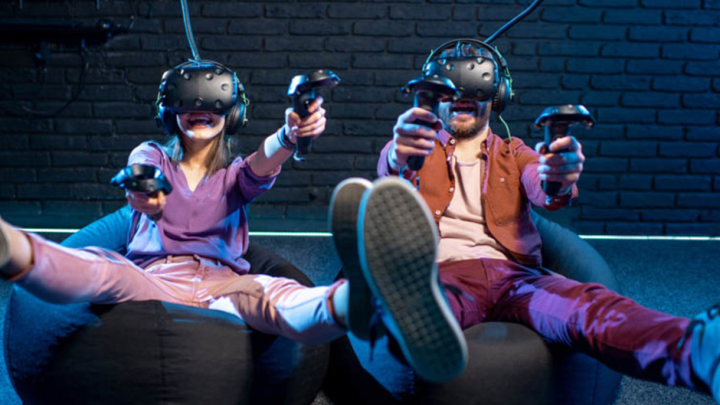The world of technology is evolving at an unprecedented pace, pushing the boundaries of human imagination. One such fascinating concept that has garnered significant attention is the Metaverse. The Metaverse represents a virtual universe where people can interact with each other and digital environments in real-time. In this article, we will explore the concept of the Metaverse and how game developers are playing a crucial role in shaping these virtual realities.
Introduction
The Metaverse, including the metaverse game development in Dubai, can be described as a collective virtual shared space that exists beyond the physical world. It is a place where individuals can immerse themselves in digital experiences, communicate with others, and engage in various activities, including metaverse game development Dubai. Inspired by science fiction novels and movies, the concept of the Metaverse, with its potential for metaverse game development in Dubai, has captured the imagination of both technologists and enthusiasts alike.
Understanding the Metaverse
The Metaverse is not a singular entity but a combination of interconnected virtual worlds, each with its own unique characteristics. These virtual worlds can range from fully immersive three-dimensional environments to augmented reality experiences. Users can access the Metaverse through different devices such as virtual reality headsets, smartphones, or computers.
The Role of Game Developers
Game developers play a vital role in the development and expansion of the Metaverse. They have the expertise to create immersive experiences, build advanced virtual worlds, and facilitate social interactions within these environments.
Creating Immersive Experiences
Game developers excel in designing captivating experiences that transport players into alternate realities. By leveraging cutting-edge graphics, sound design, and storytelling techniques, they can create virtual worlds that feel incredibly lifelike and engaging. These immersive experiences serve as the foundation of the Metaverse, enticing users to spend more time exploring and interacting within these digital realms.
Developing Advanced Virtual Worlds
Game developers possess the technical skills required to build complex virtual worlds. They can create vast landscapes, detailed character models, and interactive elements that make the Metaverse a visually stunning and interactive space. These virtual worlds offer endless possibilities for exploration, collaboration, and adventure, making them a central component of the Metaverse experience.
Also Read: Top Trustable Metaverse Development Companies in Dubai, UAE
Building Social Interactions
One of the key aspects of the Metaverse is its ability to connect people from around the globe in a shared digital space. Game developers are instrumental in creating social features that enable real-time communication, collaboration, and multiplayer experiences. From virtual chat rooms to massive online multiplayer games, game developers are pioneers in fostering social interactions within the Metaverse.
Technical Challenges in Building the Metaverse
Building the Metaverse comes with its fair share of technical challenges. Addressing these challenges is crucial to ensure a seamless and immersive user experience.
Scalability and Infrastructure
The Metaverse requires a robust infrastructure capable of supporting millions, if not billions, of users simultaneously. Game developers must design scalable systems that can handle the immense data traffic and computational demands of a virtual universe. This involves leveraging cloud computing, distributed networks, and efficient data management techniques to maintain a smooth and uninterrupted experience.
Cross-Platform Compatibility
To truly create an interconnected Metaverse, game developers need to overcome the barriers between different platforms and devices. Users should be able to seamlessly transition from virtual reality to augmented reality or switch between smartphones and computers while maintaining their virtual presence. Game developers are actively working on cross-platform compatibility to ensure a cohesive and inclusive Metaverse experience.
Security and Privacy
As the Metaverse becomes more integrated into our daily lives, ensuring security and privacy becomes paramount. Game developers need to implement robust security measures to protect user data, prevent unauthorized access, and mitigate risks associated with cyber threats. Additionally, they must establish transparent privacy policies that empower users to control their personal information within the Metaverse.
Collaboration and Standardization
Building the Metaverse requires collaboration and standardization among various stakeholders. Game developers are at the forefront of this effort, working closely with hardware manufacturers, software developers, content creators, and other industry players. Collaborative initiatives aim to establish common protocols, frameworks, and guidelines that enable seamless integration and interoperability within the Metaverse.
Also Read: How Do You Pick the Best Metaverse Game Development Company in Dubai?
The Impact of the Metaverse on Industries
The emergence of the Metaverse has the potential to revolutionize various industries, opening up new opportunities for growth and innovation.
Gaming and Entertainment
The gaming industry stands to benefit significantly from the Metaverse. Game developers can create expansive virtual worlds that offer immersive gaming experiences beyond traditional boundaries. Players can interact with their favorite characters, compete with other users globally, and participate in large-scale multiplayer events. The Metaverse blurs the line between real and virtual, enhancing the entertainment value of gaming and pushing the boundaries of what is possible in interactive experiences.
Education and Training
The Metaverse has the potential to transform education and training by providing immersive and interactive learning environments. Game developers can collaborate with educators to create educational content within the virtual world, making learning more engaging and accessible. Students can explore historical events, perform scientific experiments, or collaborate on projects in a virtual setting. The Metaverse offers a new dimension to learning, fostering creativity, critical thinking, and collaboration.
Business and Commerce
The Metaverse presents unique opportunities for businesses to connect with customers and explore new revenue streams. Game developers can create virtual marketplaces where users can buy and sell virtual goods, digital assets, and even real-world products. Brands can establish a presence in the Metaverse, offering immersive experiences, virtual showrooms, and interactive advertisements. The Metaverse blurs the boundaries between physical and digital commerce, creating a new frontier for business growth and customer engagement.
Ethical Considerations
As the Metaverse evolves, it is essential to address ethical considerations to ensure a safe and inclusive environment. Game developers, along with other stakeholders, must establish guidelines for responsible content creation, community management, and moderation. Ethical considerations include addressing issues like harassment, privacy concerns, and maintaining a healthy balance between virtual and real-world interactions.
The Future of the Metaverse
The Metaverse holds tremendous potential for shaping the future of human interaction and digital experiences. As technology continues to advance, game developers will play a pivotal role in pushing the boundaries of what is possible within the Metaverse. We can expect more immersive experiences, enhanced social interactions, and seamless integration across platforms. The Metaverse has the power to revolutionize how we live, work, and play.
Also Read: Ethereum Blockchain Transformation Using Smart Contracts
Conclusion
The Metaverse represents an exciting frontier where the lines between physical and digital realities blur. Game developers are instrumental in building and shaping the Metaverse, creating immersive experiences, developing advanced virtual worlds, and facilitating social interactions. As the Metaverse expands, it will have a profound impact on industries such as gaming, education, and business. However, ethical considerations and technical challenges must be addressed to ensure a safe and inclusive Metaverse for all users.
FAQs
1. Can anyone access the Metaverse?
Yes, the Metaverse aims to be accessible to anyone with the necessary devices and internet connection. However, certain platforms or experiences within the Metaverse may have specific requirements.
2. How is the Metaverse different from virtual reality?
While virtual reality is a component of the Metaverse, the Metaverse encompasses a broader concept of interconnected virtual worlds and shared experiences. Virtual reality refers to the use of technology to create immersive, computer-generated environments, while the Metaverse represents a collective virtual space.
3. What are some popular examples of the Metaverse?
Currently, there are several virtual worlds and platforms that can be considered as precursors to the Metaverse, such as Decentraland, Roblox, and Fortnite. These platforms offer varying degrees of social interaction and user-generated content.
4. How will the Metaverse impact the job market?
The Metaverse has the potential to create new job opportunities in various fields, including game development, virtual world design, content creation, community management, and virtual economy management.
5. Is the Metaverse limited to gaming?
No, the Metaverse extends beyond gaming. While gaming is a significant aspect, the Metaverse has the potential to impact industries such as education, entertainment, business, social networking, and more. It offers a platform for a wide range of experiences and interactions.





